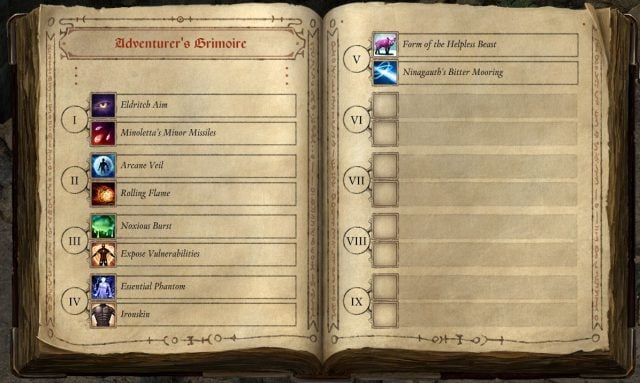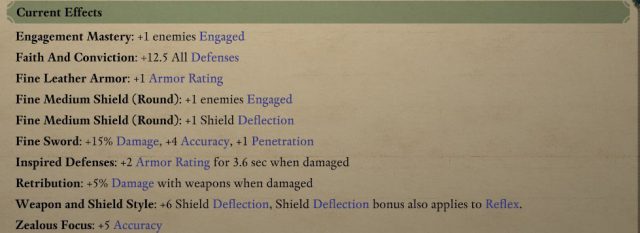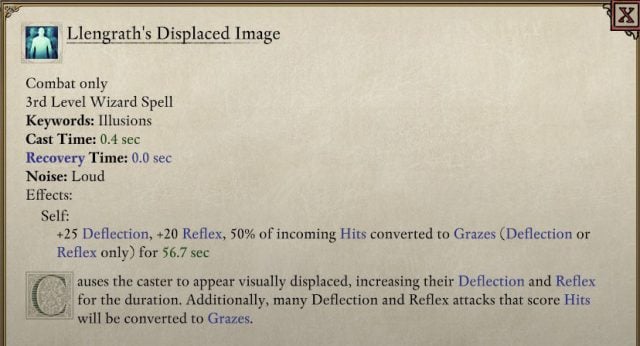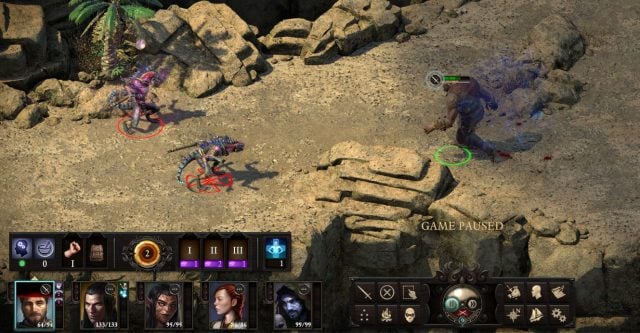Wizards are one of the 11 Classes in Pillars of Eternity 2: Deadfire, and in this Guide we’re going to take a look at how they work in order to not only help you make a better Wizard, but also help you to determine if this is the class for you. If you are new to Pillars of Eternity 2 or just need a refresher when it comes to Class selection and Character Creation, don’t worry, we’ve got you covered! Let’s get started…

Wizard Builds and How They Work
Wizards in Pillars of Eternity 2: Deadfire are a casting class that has a wide variety of spells. Many of these spells can be cast rather quickly, which renders them viable in melee range. This makes the Wizard good at Multiclassing. The whole class revolves around the use of magic, and there are 5 schools or spell types: Illusions, Evocation, Transmutation, Conjuration, and Enchanting.
Illusion spells generally debuff enemies or increase Deflection on the caster. Evocation spells usually deal elemental damage to enemies. Transmutation spells debuff enemies and deal damage. Conjuration spells typically summon something that deals damage to foes, and Enchanting spells usually buff the caster. Each has it’s own “theme”, and each can be specialized in by picking one of 5 Subclasses. Be wary though, Wizards have some of the harshest penalties in the game for choosing one, and it is not advised unless you are extremely familiar with the class.

Wizards use Arcane as their resource, and they use it to cast spells. Arcane works a bit differently than most other Classes, and instead of just being able to spend it on abilities, they can only cast a certain number of spells from each Power Level. The amount they can cast from each increases as they level up, however, this means they don’t have quite the flexibility to do what they want with their resources as some Classes.
Wizards can use items called Grimoires, that are not books that you learn spells from (like the first game), but equippable Items that you use to extend your casting repertoire. Grimoires always contain a maximum of two spells per level and the spells in a given Grimoire are immutable. This means that each Grimoire is unique, so be on the look out for them! Also, just a note here, that if a Grimoire contains spells of a school you cannot use because of a Subclass, then you will still not be able to cast them.

Wizard Subclasses, Which to Choose
In this section we’re going to take a look at the Subclasses of the Wizard and see why you might choose one of them, or not. Wizard Subclasses are more about what you lose, than what you gain. In order to select a Subclass you will lose access to 2 schools of magic in order to gain increased Power Level and reduced Recovery Time with 1 particular school. This means you must be familiar with with which spells belong to which schools, or risk making a decision you’ll regret. Let’s take a look at what the Wizard Subclasses are, and talk a bit about what sort of Builds you can make with them.
Conjurer
Conjurers specialize in summoning all manner of weapons, armor, creatures and effects to harass and damage their enemies. Conjurers make excellent Single Class characters or “pure caster” Mulitclass characters.
Bonus: Gain +1 Power Level with Conjuration Spells. Gain “Conjure Familiar” spell: Summons a helpful creature to aid the wizard. Familiars are poor at combat, but provide passive bonuses to their master.
Penalty: Lose access to spells from Evocation and Illusion schools. +20% Recovery Time for Wizard Spells not of the Conjuration School.
Conjurers can summon a Familiar that buffs their Deflection, Constitution and Power Level. Conjuration spells focus primarily on calling effects that buff you, or hinder or damage enemies, and they have some of the longest cast times in the game. Conjurers will have a larger focus on Action Speed than most casters because of this, and Dexterity can help tremendously, as can the Rapid Casting passive. Be sure to pick up Necrotic Lance early on, as it Hits extremely hard.

When Multiclassing select Druid, Priest or Chanter if you would like some more spells. The only thing that other Classes can really provide are passives that increase Damage, Crit Damage, increased Action Speed or reduced Recovery Time. Barbarian’s have Frenzy which increases both their Action Speed, Might and Constitution which works well. Monks have Lightning Strikes which increases their Action Speed and Dexterity, while also providing additional damage with Weapons. And, Paladins can increase the total damage to their target with Sworn Enemy.
Enchanter
Enchanter Wizards favor buffing themselves to the highest imaginable heights to the detriment of all other magic types. They are excellent at Multiclassing, particularly for those wishing to be tanks.
Bonus: +1 Power Level with Enchanting Spells. Gain “Free Action” passive: Once per encounter, when the wizard is affected by a Dexterity Affliction, they will clear that effect and become temporarily immune to Dexterity Afflictions.
Penalty: Lose access to spells from Illusion and Transmutation schools. +20% Recovery Time for Wizard Spells not of the Enchanting School.
Enchanters gain immunity from the first Dexterity Affliction they suffer in combat, and all others for a short period afterward. Nearly all Enchanter spells target the caster and have extremely short cast times, meaning they spend very little time casting. This gives them the opportunity to spend more time than most Wizards attacking with weapons, and allows them to Multiclass with martial Classes more effectively. And, since a good number of their spells are defensive, Enchanters make excellent candidates for the tank role.

Enchanters can Multiclass effectively with any class, however most of their buffs are meant for combat, so martial Classes are a natural choice here. I suggest either Fighter, Paladin, Monk or Druid.
Unbroken are the most suited Fighters to tanking because they cannot only Engage more enemies, but deal incredible damage to those that Disengage from them, and so are the natural choice here. Just remember that Eldritch Aim and Disciplined Barrage don’t stack, so don’t take both of these abilities.
Paladins tank very well because of their high defensive capabilities, and their Auras will gain a larger radius due to the high Intellect that Enchanters have. Choose The Shieldbearers of St. Elgca for their extra enemy Engaged, as well as their ability to prevent someone from dying with Lay on Hands.

Monks gain Wounds when struck, allowing them to have a secondary resource pool. They work very well here because they typically wear no or Light Armor, and the defensive buffs from Enchanting could offset this somewhat. Eldritch Aim also increases their Hit chance, much like a Fighter would.
Druids work exceptionally well here because the short cast times of Enchanting spells, means they can spend time casting Druid spells. Enchanting buffs also apply while shifted, so they can reach very high Armor values while doing so, and become extremely tanky. It’s just win/win.

Evoker
Evoker Wizards are some of the most reliable damage-dealers of the class, and focus primarily on killing enemies. Select this Subclass if you want stronger Evoker spells, with a slight chance to double cast them.
Bonus: +1 Power Level with Evocation Spells. Your evocation spells have a small chance to “echo”, reapplying their damage and effects to their targets again, instantly.
Penalty: Lose access to spells from Transmutation and Conjuration schools. +20% Recovery Time for Wizard Spells not of the Evocation School.
Evokers focus on dealing high damage to enemies and their spells have shorter cast times than Conjurers. Since they have a chance to recast Evocation spells instantly for free, they can generally outperform other schools in terms of raw damage. Evokers maintain access to Enchanting spells, allowing them to buff in between casts.

Many early Evoker spells have almost zero cast time and cannot miss. For this reason, and the fact they can still use Enchanting spells, they can Multiclass effectively with just about any class. I would suggest either a Druid, Paladin or Priest.
Illusionist
Illusionists excel at Crowd Controlling enemies, and debuffing them over all other Wizards. The combination of these, with spells that buff their Deflection and Defenses, make them incredibly hard to kill.
Bonus: +1 Power Level with Illusion Spells. Gain “Reflexive Mirror” passive: Once per encounter, when first attacked, automatically gain the effects of the spell “Mirrored Images”.
Penalty: Lose access to spells from Conjuration and Enchanting schools. +20% Recovery Time for Wizard Spells not of the Illusion School.
Illusionists not only Blind and debuff enemies, they also increase their own Deflection to extraordinary heights. First, they gain Reflexive Mirror which gives them a huge boost to Deflection if they are struck in combat, and it has an extremely long Duration. And second, Llengrath’s Displaced Image is one of the best early game tanking abilities there is, reducing many Hits to Grazes, also for a very long Duration. Because of the long Durations of many of their buffs, Intellect is much more important to the Illusionist than most other Wizards.

Illusionists Multiclass very well with the same classes listed in the Enchanter section, but also Rogues. Rogues have a passive called Riposte that allows them to do Full Attacks against enemies that miss them with melee weapons that target Deflection. This synergizes nicely, because Illusionists specialize in Deflection. Tricksters automatically gain some of these spells, so this could free up your Ability Points for Rogue passives or other spells.
Transmuter
Transmuters specialize in the art of debuffing many foes at once, protecting their group with lots of Crowd Control abilities. And, because they still have access to Conjuration spells, they still have moderate damage.
Bonus: +1 Power Level with Transmutation Spells. Gain “Form of the Fearsome Brute” spell: Transforms the wizard into an Ogre. While in this form, spells are disabled, but physical attributes are increased.
Penalty: Lose access to spells from Enchanting and Evocation schools. +20% Recovery Time for Wizard Spells not of the Transmutation School.
Transmuters are great at rendering enemies ineffective, and will spend a good amount of their time debuffing and CCing enemies. They can also change into a giant Ogre, which works somewhat like the Druid’s Spiritshift, and they cannot cast spells (just like the Shifter) while transformed. Because they want their targets to be CCed for as long as possible, Transmuters will need to focus heavily on Intellect for best results.

Transmuters will most likely Multiclass with other casting Classes or stay as a Single Class. However, Rogue works here because they deal increased damage with weapons against Afflicted targets and they have a passive (Deathblows) that increases the damage further if they have 2 or more Afflictions at once. In addition, Transmuters can also Paralyze targets, increasing the chance they will take Crit Damage substantially, and Assassins gain bonus Crit Damage.
No Subclass
No Subclass Wizards have all spells available to them, which no Subclass does. This is their biggest strength. Select this if you are a new Wizard player, or unsure just which spells you want to use, or just don’t want to be locked out 2 schools.
Bonus: None
Penalty: None
No Subclass Wizards aren’t locked out of any schools, and so have access to all spells the Wizard class possesses. This is a great reason to choose this, as some of the other bonuses are probably not strong enough to justify loosing 2 schools. Unless you know just exactly which spells you want, or are familiar with the full gamut of Wizard spells, this is probably the best choice for you.

No Subclass Wizards can Multiclass in any manner they see fit, and any of the recommendations above will work for them. There are so many options it would be impossible to list them here.
Attributes and Races
The last thing we’re going to cover here is Attributes and Races and how they affect the Wizard. The game recommends Dexterity and Perception and highly recommends Might and Intellect. Dexterity helps with Action Speed, making spells cast faster, and their Recovery Time shorter. Perception helps with Accuracy, which is very important to casters because they don’t get bonuses to their spells from Weapons or Weapon Abilities. Might helps with raw damage, and Intellect helps with AoE radius and Duration.

Just exactly how much of these you should have depends on the Subclass you selected, and I will make my recommendations along with Race below:
Conjurer – Prioritize Dexterity, Intellect and Might. Conjuration spells have some of the longest cast times in the game, so Dexterity goes a long way to making this faster. Intellect helps with some of the longer Durations of the summons, and Might helps with Damage. Perception isn’t as important to a Conjurer, because many of their spells target the ground or themselves, so Accuracy isn’t a priority. Godlike is a great choice here.
Enchanter – Prioritize Intellect. Intellect helps with the Duration of the buffs you apply to yourself (or debuffs to enemies). What other Attributes you will choose will depend on what you do when you aren’t casting Enchanting spells. Varies.
Evoker – Prioritize Might and Perception. Might for pure damage, and Perception to make sure you connect. Note that many early level Evocation spells cannot miss, but you will want this for later ones. Aumaua or Elf both work here.
Illusionist – Prioritize Intellect and Perception. Illusion spells almost never deal damage, so you’ll want to focus on the Duration of these spells via Intellect, as well as their Accuracy via Perception. Elf and Godlike both make great choices.
Transmuter – Prioritize Intellect, Dexterity and Perception. Transmuters focus mainly on AoE debuffs and a bit of damage. Take Intellect to increase the AoE size of these spells, as well as increase their Duration. Dexterity helps with the longer cast times and Perception ensures you will connect. Godlike for the win.
No Subclass – Prioritize Might, Intellect, Perception and Dexterity. No Subclass Wizards will most likely use a wide variety of spells so they will need a bit of everything. Any of the races listed above will work here.
Final Tips
Spells Crit much less often than abilities that use Weapons because they don’t gain bonus Accuracy from the weapons you are holding, and they don’t gain the benefit of Weapon Abilities that grant Accuracy. This means points in Perception help with spells Hitting their targets, but rarely doing Crit Damage. The best ways to increase your Crit chance are by taking passives that affect spells as well, like Uncanny Luck or Dirty Fighting. And, by also using abilities that buff Crit chance, not just Crit chance with weapons. Merciless Gaze and Disciplined Strikes both come to mind.

Weapons play little to no impact in spell casting, and the passive abilities related to them, do not affect spells. Two Weapon Style does not reduce Recovery Time with spells, One-Handed Style does not increase the likelihood of a Crit with spells, and Two-Handed Style doesn’t increase spell damage. However, Shields will penalize your Accuracy, which will effect your spells.
Action Speed not only reduces Cast Time, but also reduces Recovery Time, and is extremely helpful to Wizards. Look for equipment that increases Action Speed, and when Multiclassing look for abilities that do as well, like the Monk’s Swift Strikes or the Barbarian’s Frenzy. Also remember that Dexterity has the same effect, so look for Inspirations that increase your Dexterity to further speed up casting.

Lastly, be sure to check the spells of Grimoires you find because they might have exactly the ones you need! Study the Wiki to see what they give, that way you can plan your build out in advance, and not waste Ability Points on spells you know you can get from using a Grimoire.
Stay tuned for more Pillars of Eternity 2: Deadfire Class Guides as we cover all 11 Classes as well as Character Creation! What did you think of the Guide? Was it helpful? Leave your thoughts in the comments below.

Log in to leave a Comment